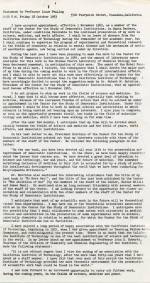|
His mood was marred, however, soon after the announcement, when he read in the local
newspaper the reaction of the President of Caltech, Lee DuBridge. "The Nobel Peace
Prize is a spectacular recognition of Dr. Pauling’s long and strenuous efforts," DuBridge
said. "Though many people have disapproved of some of his methods and activities,
he has, nevertheless, made a substantial impact on world opinion, as this award clearly
proves." Pauling was angered by the statement. It appeared that the great honor he
had brought to his school was being greeted with lukewarm praise and a reminder about
his questionable "methods and activities." He received no word of personal congratulations
from DuBridge, no indication of institutional pride. Ava Helen was furious.
Pauling had been increasingly unhappy at Caltech ever since his resignation as chemistry
division chair, and DuBridge’s statement -- along with the substantial prize money
that accompanied the Nobel -- helped him make up his mind about something he had been
considering for years. On October 18, one week after learning he had won the Prize,
Pauling called a press conference at his Pasadena home, announcing that he was resigning
his professorship at Caltech and taking a position at the Center for the Study of
Democratic Institutions, a liberal California think-tank. The decision to move on
after forty-one years at the school reflected, he said, a change in his personal priorities.
It also signaled another step away from science and toward full-time political work.
|
|
Click images to enlarge

Linus Pauling, Oslo. December 21, 1963.

"Statement by Professor Linus Pauling." October 18, 1963.
"It seemed to me that he felt so alienated from the whole department of chemistry
that he went ahead and moved in this dramatic way. But once again, ever mindful of
everyone else, he worked hard for weeks to make sure that every single one of his
associates was taken care of, including myself."
|

